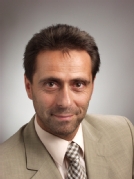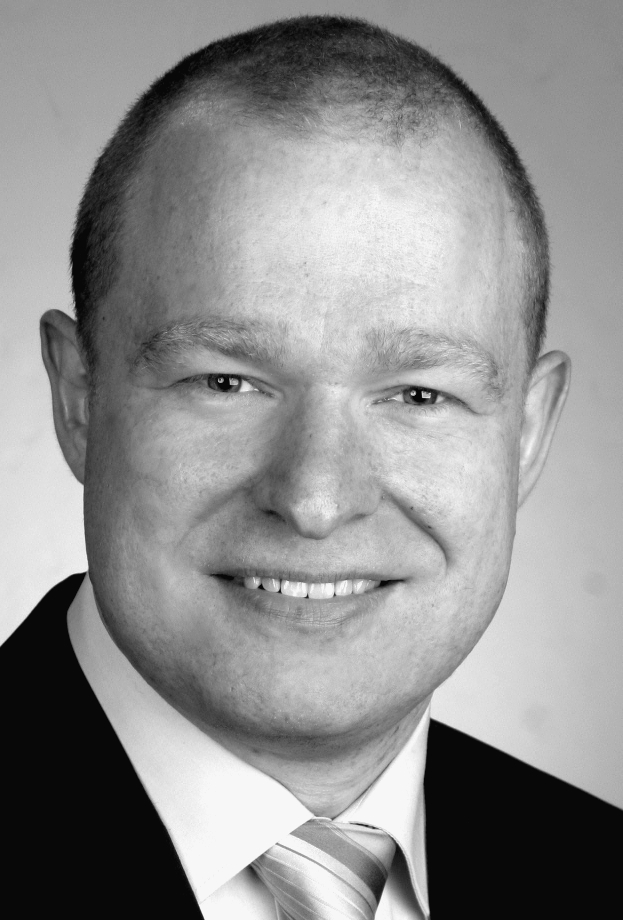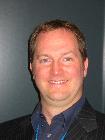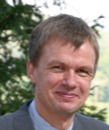... also available as pdf.
Tuesday 18th October 2011
| 08:30-09:00 | Registration |
| |
| Tutorials |
| 09:00-10:30 | B. Legeard, Smartesting: Model-based testing for Information systems
[pdf
ppsx]
|
| 09:00-10:30 | A. Kramer, Sepp.med: Looking for a needle in a haystack
[pdf]
|
| |
| Coffee Break |
| |
| Tutorials |
| 10:50-12:20 | S. Schulz, Conformiq: Automated test design with Model-Based Testing
[pdf]
|
| 10:50-12:20 | M.-F. Wendland et al., Fraunhofer FOKUS: UTP 1.1 Review and Preview Testing |
|
Part 1: [pdf
ppsx]
Part 2: [pdf
ppsx]
Part 3: [pdf
ppsx]
Part 4: [pdf
ppsx]
|
| |
| Lunch |
| |
| Tutorials |
| 13:15-14:45 | N. Kicillof, Microsoft: Model-Based testing with .NET
[pdf
ppsx]
|
| 13:15-14:45 | A. Faucogney, All4tec: MBT approach applied on an embedded system |
| |
| 15:00-15:15 | Conference Opening |
| |
| Keynote |
| 15:15-16:00 |
K. Stobie, Microsoft: Model-Based Testing Spreading Into Many Industrial Domains
[pdf]
|
| |
| Coffee Break |
| |
| Session 1: Enterprise and Cloud |
| 16:15-16:35 | K. Chopra et al, Microsoft: Applying Model Based Testing to the Windows Web Services Software Process
[pdf
ppsx]
|
| 16:35-16:55 | S. Wieczorek et al, SAP: Model-Based Testing of Enterprise Software |
| |
| 16:55-18:00 | Reception |
Wednesday 19th October 2011
| 08:30-09:00 | Registration |
| |
| Keynote |
| 09:00-09:45 | J. Hammer and S. Blom, Deutsche Telekom AG: Model-based Testing @ Telekom
[pdf] |
| |
| Session 2: Embedded Systems |
| 09:45-10:05 | R. Gerlich and R. Gerlich, BSSE: Integrated Design and Testing of Safety-Critical Real-time Systems in Space
[pdf]
|
| 10:05-10:25 | A. Pietschker and R. Christl, Giesecke & Devrient: MBT for real-time embedded software
[pdf]
|
| 10:25-10:45 | P. Graf et al, FZI: eMOTE: A Real-time Approach to Model-based Testing of Embedded Software
[pdf]
|
| |
| Coffee Break |
| |
| Session 3: Standardization and Compliance |
| 11:15-11:35 | S. Weißleder, Fraunhofer FIRST: Relation of Model-Based Testing and Safety-Relevant Standards
[pdf
ppsx]
|
| 11:35-11:55 | A. Faucogney, All4tec: Model-Based Testing in automotive and its standardization layers
[pdf
ppsx]
|
| 11:55-12:15 | A. Khoroshilov and A. Petrenko, ISPRAS: Model Based Testing in Linux Standard Base Compliance Program
[pdf
pps]
|
| |
| Lunch |
| |
| Keynote |
| 13:30-14:15 |
C. Willcock, Nokia Siemens Networks: The ITEA D-MINT Project: Overview, Results, and Lessons Learnt
[pdf]
|
| |
| Session 4: Adoption and Deployment |
| 14:15-14:35 | H. Robinson, Microsoft: Beyond Formal Modeling: Heuristic-Based Industrial Test Automation |
| 14:35-14:55 | H. Fredriksson, Ericsson: Experiences from Introduction and Deployment of MBT at Ericsson
[pdf
pps]
|
| 14:55-15:15 | S. Schulz, ETSI: Update on Current TC MTS Activities on MBT Standardization
[pdf]
|
| |
| Coffee Break |
| |
| 16:00-17:00 |
Sponsor Presentations
Sepp.med [pps],
Codenomicon [pdf],
Conformiq,
MathWorks [pdf]
|
| |
| 18:00 | Departure Social Event |
Thursday 20th October 2011
| 08:30-09:00 | Registration |
| |
| Keynote |
| 09:00-09:45 | M. Weber, Carmeq/TUB: Model-Based Development and Testing of Automotive Software – Some Experiences and Challenges
[pdf] |
| |
| Session 4 (Cont): Adoption and Deployment |
| 09:45-10:05 | S. Szell and G. Federics, Nokia Siemens Networks: Model Based Testing deployment in telecommunication project
[pdf]
|
| 10:05-10:25 | A. Karapantelakis et al., Ericsson: Experiences from applying MBT in an Agile SCRUM context
[pdf
pps]
|
| |
| Coffee Break |
| |
| Session 5: Communication and Multimedia |
| 11:15-11:35 | M. Suhr et al, Alcatel-Lucent: Model Based Testing applied to Video Testing
[pdf]
|
| 11:35-11:55 | M. Katara, TUT: Experiences in Model-Based GUI Testing of Smartphone Applications
[pdf]
|
| 11:55-12:15 | S. Mera and S. Tan, Microsoft: Using MBT to test Microsoft Lync Client conversation feature
[pdf
ppsx]
|
| |
| Lunch |
| |
| Session 6: Tools and Techniques |
| 13:30-13:50 | V. Kuliamin et al, ISPRAS: Case Studies of Summer Model-Based Testing Framework
[pdf]
|
| 13:50-14:10 | A. Ulrich, SIEMENS: A scenario-based test approach for testing reactive concurrent systems
[pdf]
|
| 14:10-14:30 | M. Bureck et al, Fraunhofer FOKUS: MBT Automation with Fokus!MBT and ModelBus
[pdf]
|
| 14:30-14:50 | P. Braun et al, Validas: Tactic-Based Testing
[pdf
pps]
|
| |
| Coffee Break |
| |
| Session 7: System and Integration Testing |
| 15:20-15:40 | A. Pietschker and A Beimler, Giesecke & Devrient: Shared Models for SW and Systems
[pdf]
|
| 15:40-16:00 | M. Armholt, Ericsson: Model Based Test Design for Performance Testing and other Non-Functional Requirements
[pdf
pps]
|
| |
| 16:00 | Best Presentation Award & Conference Closure |
|
Keith Stobie, Microsoft [pdf]

|
Keith Stobie was a Test Architect at Microsoft and is currently working at Doyenz. He has spent 25 years in software testing and 10 years at Microsoft on a variety of projects and collaborating with many MBT adopters. Keith he plans, designs, and reviews software architecture and tests for Bing Infrastructure. Previously, Keith worked in the Protocol Engineering Team on Protocol Quality Assurance Process including MBT to develop test framework, harnessing, and model patterns. With twenty-five years of distributed systems testing experience Keith's interests are in testing methodology, tools technology, and quality process.
|
Title: Model-Based Testing Spreading Into Many Industrial Domains.
Abstract: From simple heuristic models supporting automated exploratory testing to formal models for verification of protocols or implementations of standards, Model-Based Testing is spreading into industrial practice. Microsoft has been exploring industrial use of MBT for years with numerous tools and approaches, including releases from research and now publicly add-ons to products. This talk addresses what are characteristics allowing success and what challenges tend toward failure in industrial adoption. MBT is now used daily by ordinary testers in the testing of several very different products, with the same tools you could use.
Some technical characteristics of success are dealing with state explosion, test data generation and control, and test case generation, including correlating with requirements and reuse of tests while model changes over time.
Other characteristics of success include training, support, and building a user community.
Jörg Hammer, Sören Blom, Deutsche Telekom AG
[pdf]

|
Jörg Hammer is working as a chief test manager in the IT Technical Solution Service division within the Telekom Deutschland GmbH since April 8, 2010.
This division is responsible for all IT- systems supporting Technical Service.
The "test" department of the "IT Technical Solution Service" division is in charge for the implementation of all system software releases.
Before that, Mr. Hammer was responsible for the implementation of "UML" for all IT projects of Telekom Deutschland GmbH for 3 years.
The objective was to have all IT-projects follow the same method, called "T-UML", which covers everything from requirements to business processes to the final realization .
The challenge was to standardize the various IT-projects requirements and to provide solutions with the maximum degree of overlap, based on business processes.
As a member of the "Testboard" Jörg Hammer participates in establishing test standards and drives the improvement of existing processes, as well as pioneering new and innovative solutions.
|

|
Sören Blom is a research scientist and project manager at Deutsche Telekom Laboratories, Berlin. He is part of the "IT Architecture and Quality Assurance" team, where he works on software engineering and software development method projects, most recently in the context of cloud services and cloud-based systems. Sören was project leader of an R&D project that developed a Model-based Testing approach for Telekom Deutschland's IT testing processes. Before joining Deutsche Telekom Laboratories in 2009 he was a research assistant at the University of Leipzig for three years.
|
Title: Model-based Testing @ Telekom
Abstract: Telekom Deutschland GmbH provides 37 million mobile and 22.5 million landline connections, of which about 11.8 million offer broadband access. Our customers can visit us in more than 800 Telekom Shops or get in touch with one of over 1,000 distribution partners. In Germany, about 77,000 individuals are employed, almost 3,000 working in IT. 553 IT applications operate our business processes. Roughly 500 projects are conducted per year to improve and modernize our processes and IT.
IT-Deutschland emerged from the successful merger of T-Mobile and T-Home and introduced a unified, modern IT development process, which focused on a contiuous and consistent UML modeling - from requirements definition through implementation. Initially, individual projects engaged in Model-based Testing (MBT), but it was soon considered a general possibility to extend the continuos modeling of system specifications to test specifications. Together with Deutsche Telekom Laboratories and Fraunhofer FOKUS, a year-long R&D project was initiated in early 2010. The project produced insights regarding the feasibility of adapting MBT and a MBT modeling method tailored to the needs of Telekom Deutschland. Based on these experiences from this project we want to present our view on promises and challenges of Model-based Testing for large IT organizations.
Colin Willcock, Nokia Siemens Networks [pdf]

|
Colin Willcock is currently manager for 3GPP Radio Access Network Standardisation at Nokia Siemens Networks. He received a BSc from Sheffield University in 1986, an MSc from Edinburgh University in 1987, and a PhD in parallel computation from the University of Kent in 1992. Colin was part of the core ETSI team that developed the TTCN-3 language and spent many years leading and participating in the TTCN-3 language maintenance. In the past, he has worked on numerous standardization efforts at ETSI, ITU-T, and 3GPP, focusing on various aspects of formal specification languages. He was the project leader for the European TT-medal project, which strove to improve test methodology and languages for software-intensive systems and also lead the D-MINT project, which aimed to improve test methodology and languages for software-intensive systems and explored the use of model-based testing in an industrial context.
|
Title: The ITEA D-MINT Project: Overview, Results, and Lessons Learnt.
Abstract: The key to future European competitiveness lies in cost-effective and efficient development of complex software systems. In such systems 40 to 60% of the overall costs of developing the product lies in testing. With this in mind the aim of the D-MINT project was to provide a new leading edge model-based testing technology that enables the production of high quality software-intensive systems at reduced expenditure in terms of time and money. More specifically the goal was to turn model-based testing from academic discipline into industrial reality. With 26 partners based in six European countries, working in a large number of disparate domains, the D-MINT project was able to provide results which are meaningful across many industries and provide a ‘real world’ reflection on the application of model-based testing. This presentation provides an overview of this project, explaining the industrial domains covered and briefly discussing the tools and technologies that have been used. The main focus of the presentation in on the results and lessons learnt.
Matthias Weber, Carmeq GmbH / TU Berlin [pdf]

|
Matthias Weber graduated in computer science at University of Karlsruhe, where he also obtained a doctoral degree in computer science. In 1996 he received a habilitation degree in computer science from Technical University of Berlin. From 1997 to 2006 he was working in the area of automotive software development at Daimler AG and since 2006 he is working in the same area at Carmeq GmbH, a subsidiary of Volkwagen AG.
In 2006 he received an adjunct professorship in computer science from Technical University of Berlin where he is regularly teaching.
|
Title: Model-Based Development and Testing of Automotive Software – Some Experiences and Challenges.
Abstract: This talk will introduce the development process for automotive electronics and discuss some experiences and challenges in the areas of model-based development and testing of automotive software.
|